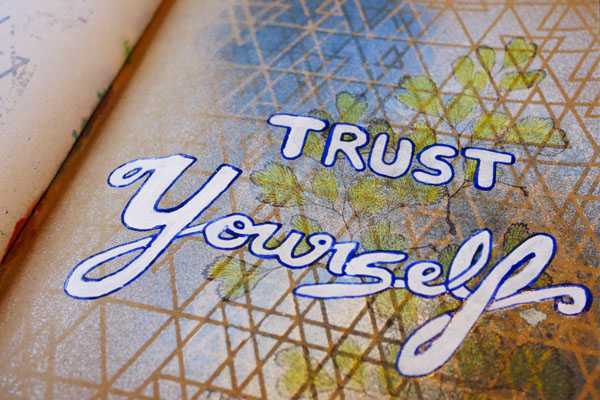
Learning to Trust Ourselves
The importance of trust, especially in learning to trust ourselves is a topic that has been coming to mind lately. Trust is not an easy thing to build and it can be damaged very quickly. So how do we learn how to trust others, and even more, how to trust ourselves?
Building Trust
Building trust sounds like an easy thing, but with trust really being part of our emotional being, how do we build trust that lasts? I’ve been reading “Start with Why” by Simon Sinek this month and I’ve been re-evaluating the way I look at trust.
Building trust isn’t an easy thing, especially if you’ve had past trauma related to broken trust. It needs to be understood that trust is built on common ground. This can be based on our values and beliefs, a common interest or a common passion. It is being willing to show vulnerability, willing to connect to others and find a sense of belonging.
Trust Takes Time
Trust takes time to build and it requires vulnerability. Mutual trust requires us to be in a place where we understand the other person and they understand us as well. When we feel trust in our place of work it’s often because the organization’s goals and ours align. As Simon Sinek says, “When we share values and beliefs with others, we form trust.”
We do not need to have all things in common to gain trust. On the contrary, often the people I have the closest attachment to are quite different from me in many ways. Their difference in opinions and thoughts is a very valuable thing. They can show me a different perspective and help me re-evaluate how I see the world. The flip side to this is being around those who do not share any similar beliefs or values can make it hard to connect in an authentic way. Usually there needs to be something in common that brings us together.
Time is your friend when it comes to building trust. Trust is rarely established immediately. Occasionally you will meet people where you feel a sense of trust fairly early in the relationship. They care for you, accept you and it is easy to find connection and vulnerability with them. These relationships are precious but I don’t think they are the norm.
We need to show caution when it comes to trust. If we trust quickly and deeply without understanding the true character of the other person, we can get hurt. By showing discernment in relationships, to see people for who they are, both good and bad, we can evaluate if they are worthy of our trust. This allows us to build healthy friendships and have great people in our lives.
Trusting Yourself
Showing discernment in trusting others is a way of showing that we trust ourselves. There are many times in our lives when people or organizations can seem trustworthy, but in the end do not always live up to that trust. Discernment is one way what we show that we trust ourselves enough to know when something doesn’t feel right. We know we shouldn’t trust it and it’s something that is not good for our lives.
Beliefs and Values
Trusting ourselves starts with understanding our foundation for decision making. By defining what we believe, what our values are and how our faith affects those values can help us understand what is important to us.
It can be easy to feel unbalanced when we are dealing with people who do not understand our values or are verbally combative about us having different beliefs. If we do not know what we believe, this allows others to fill that void with their opinion. This may not be respectful or helpful, or true to who we are. We need to know what we believe and what is important to us. By defining our values and what we believe will help us to keep our sense of self.
Awareness and Acknowledgement
An important part of trusting ourselves is having the awareness to acknowledge that those around us may not agree with our values, thoughts or opinions. Understanding that not everyone thinks the same way will help us understand how to handle situations that are challenging our beliefs.
This doesn’t mean that we hide who we are. Instead it means that we can embrace the person we disagree with for who they are. This does not necessarily mean agreeing with them but understanding that we think differently and have different convictions. The most important thing is to show love for who they are and realize that they have come to their conclusions honestly, even if we do not agree. We don’t have to change their minds to trust (and may not be able to).
Showing Respect
Having a different opinion from others doesn’t have to be an issue if we show each other respect. I have had many experiences in my life where people have been overly cutting, rude and verbally abusive when I have shared a differing opinion. It’s a very uncomfortable place to be. If the situation is not one where there is a respectful exchange of opinions and ideas, it is a situation that you should remove yourself from if possible. When respect is absent, the scenario becomes one person talking at another person to get them to agree instead of an exchange of ideas and opinions.
In trusting ourselves we must show caution. If we become self-involved to the point where we are unable to see a differing opinion as anything but a threat, we have taken trusting ourselves to an unhealthy place. I have been around bullying where there was no room for disagreement or other thoughts. This is very dangerous. We need to ask ourselves whether we are being respectful and kind in the way that we are dealing with difference in opinion. Are we taking into account the other person’s thoughts, feelings and experiences?
Three Statements About Trusting Ourselves
There are three statements about trusting ourselves I often ask myself when I’m trying to navigate a healthy balance with others.
Speak My Truth
Speak my truth by saying what I mean and meaning what I say through the lens of kindness. Is what I’m saying life giving? Is the other person speaking in a respectful and life giving manner? Speaking my truth means speaking with no expectation that I will be understood or that they will agree with me.
We need to be honest in what we say, and it’s not our job to worry how others will respond. That being said, we need to be aware that words are powerful. They can hurt others. With being able to speak our truth we also need to take responsibility for our words and the consequences connected to what we say.
Be Nice With My Words
Be nice with my words means not saying things in a cutting or mean way. There is always room for kindness when speaking truthfully.
Treat People With Dignity
I must give the people around me the dignity to feel what they feel. They may not agree with me, but I should not take that personally. I may not agree with the fact that they do not agree, but they do not need me to rescue them or change their minds. They need be given the dignity to make the choices and have their own opinions.
What Do You Think?
What do you think about the concept of trusting yourself? I would love to hear what you have to say on the subject. Feel free to comment below or to contact me directly. I’d love to start a conversation with you!




